Daily Vocabulary Words: List of Daily Used Words in Leading Indian Newspapers
Hi there. Welcome to this special section @ Wordpandit. Our endeavour here is straightforward: highlighting daily vocabulary words that you would come across in leading newspapers in the country. We have included the following newspapers in our selection:
• The Times of India
• The Economic Times
• Hindustan Times
• Mint
• Indian Express
We are putting in extensive work to develop your vocabulary. All you have to do is be regular with this section and check out this post daily. This is your repository of commonly used words; essentially, we are posting a list of daily used words. Hence, this has significant practical application as it teaches you words that are commonly used in leading publications mentioned above.
Visit the website daily to learn words from leading Indian newspapers.
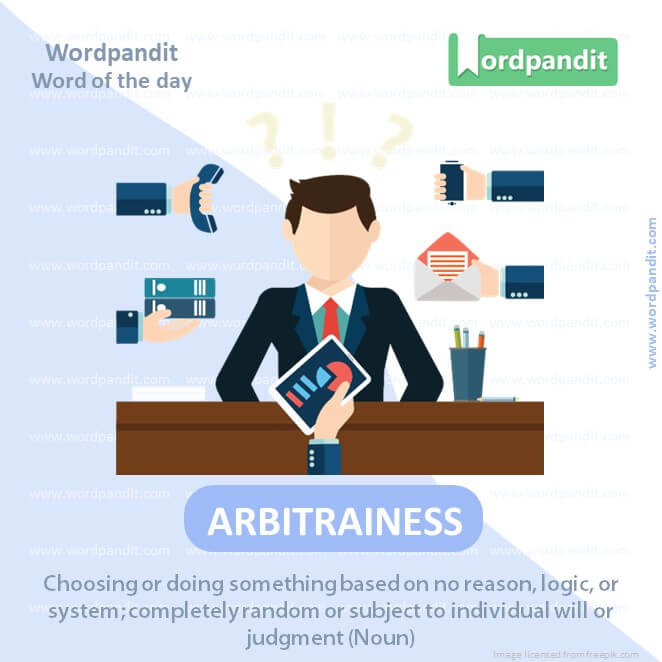
WORD-1: ARBITRARINESS
CONTEXT: In times, when executive arbitrariness in governance is only increasing globally, this is something that a democracy should cherish.
SOURCE: Indian Express
EXPLANATORY PARAGRAPH: Imagine you’re picking out crayons to draw a picture. Instead of choosing colors that look nice together or make sense for what you’re drawing, you close your eyes and pick crayons randomly. That’s like being arbitrary! When something is “arbitrary,” it means it’s chosen or done without a good reason. It’s like flipping a coin to make a choice when it doesn’t really matter.
MEANING: Choosing or doing something based on no reason, logic, or system; completely random or subject to individual will or judgment (Noun).
PRONUNCIATION: Arr – buh – trayr – ee – ness
SYNONYMS:Randomness, Whimsicality, Capriciousness, Haphazardness, Unpredictability, Indiscriminateness, Chance.
USAGE EXAMPLES:
1. The arbitrariness of his decision to pick a movie baffled everyone, as he seemed to have no particular reason for his choice.
2. The teacher tried to avoid arbitrariness when assigning seats by using a seating chart.
3. She was frustrated by the arbitrariness of the new company rules, which seemed to have no logical basis.
4. The judge was criticized for the arbitrariness of his rulings, which did not follow any set guidelines.
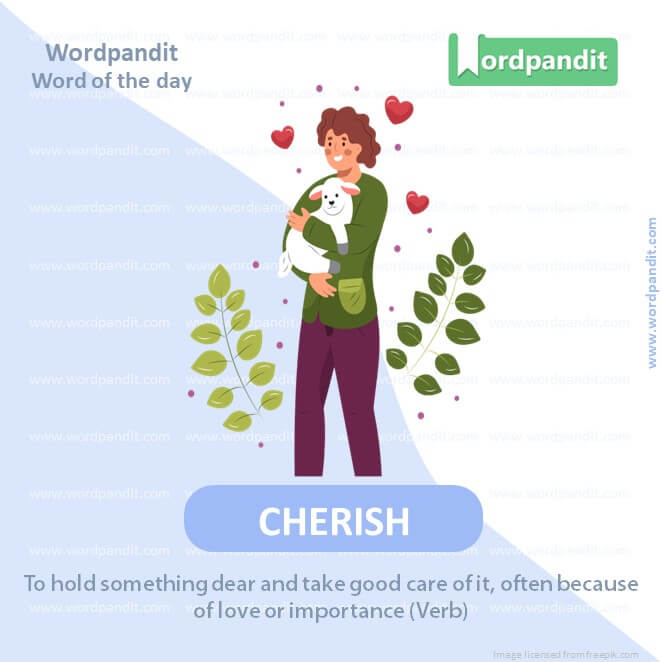
WORD-2: CHERISH
CONTEXT: In times, when executive arbitrariness in governance is only increasing globally, this is something that a democracy should cherish.
SOURCE: Indian Express
EXPLANATORY PARAGRAPH: You know how you love your favorite stuffed animal and take really good care of it? The word “cherish” means to love something a lot and to take very good care of it, just like you do with your stuffed animal!
MEANING: To hold something dear and take good care of it, often because of love or importance (Verb).
PRONUNCIATION: cheh-rish
SYNONYMS: Adore, Treasure, Value, Appreciate, Hold dear, Esteem, Love
USAGE EXAMPLES:
1. She cherishes her family above all else.
2. I cherish the memories we created together.
3. Always cherish the time you spend with loved ones.
4. Children should be cherished and nurtured.
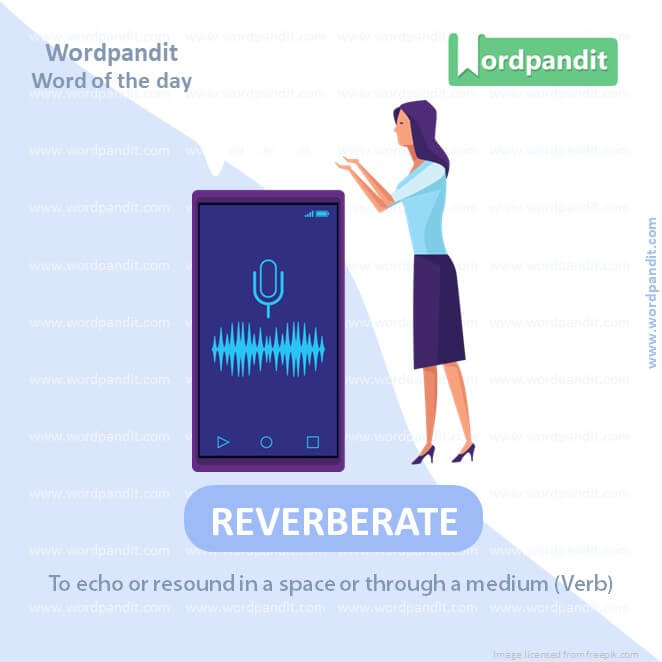
WORD-3: REVERBERATE
CONTEXT: Over two years after a constitutional bench of the Supreme Court rejected Maharashtra’s legislation to carve out a standalone reservation for Marathas over and above the existing ones, the issue continues to reverberate.
SOURCE: Times of India
EXPLANATORY PARAGRAPH: You know when you shout in a big empty room, and you hear your voice come back to you again and again? That’s what “reverberate” means. Your voice bounces back and fills the room.
MEANING: To echo or resound in a space or through a medium (Verb).
PRONUNCIATION: ree-ver-buh-rayt
SYNONYMS: Echo, Resound, Ring, Resonate, Reflect, Pulsate, Boom
USAGE EXAMPLES:
1. The sound of the drum reverberated through the hallway.
2. Her laughter reverberated in the empty room.
3. The news of his success reverberated through the community.
4. The impact of her words reverberated long after she left.
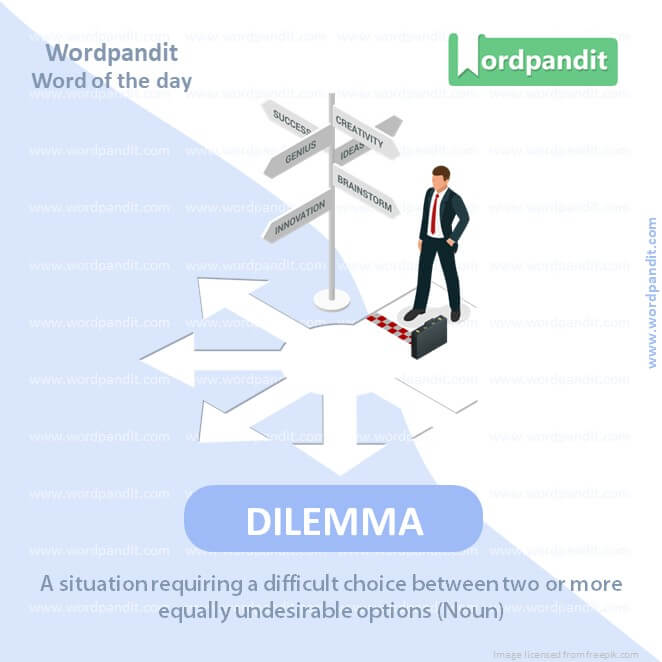
WORD-4: DILEMMA
CONTEXT: Doctrines like the Basic Structure Doctrine seek to address this dilemma.
SOURCE: Indian Express
EXPLANATORY PARAGRAPH: Imagine you have two flavors of ice cream in front of you, chocolate and strawberry, and you can only pick one. It’s hard to decide, right? That’s a “dilemma.” A dilemma is when you have to make a choice, but it’s really tough because both options have good and bad parts.
MEANING: A situation requiring a difficult choice between two or more equally undesirable options (Noun).
PRONUNCIATION: dai-lem-uh
SYNONYMS: Quandary, Predicament, Conundrum, Puzzle, Plight, Catch-22, Pickle
USAGE EXAMPLES:
1. He was in a dilemma about which job offer to accept.
2. The dilemma of whether to stay or leave was tearing her apart.
3. The ethical dilemma was discussed in class.
4. Parents often face the dilemma of balancing work and family.
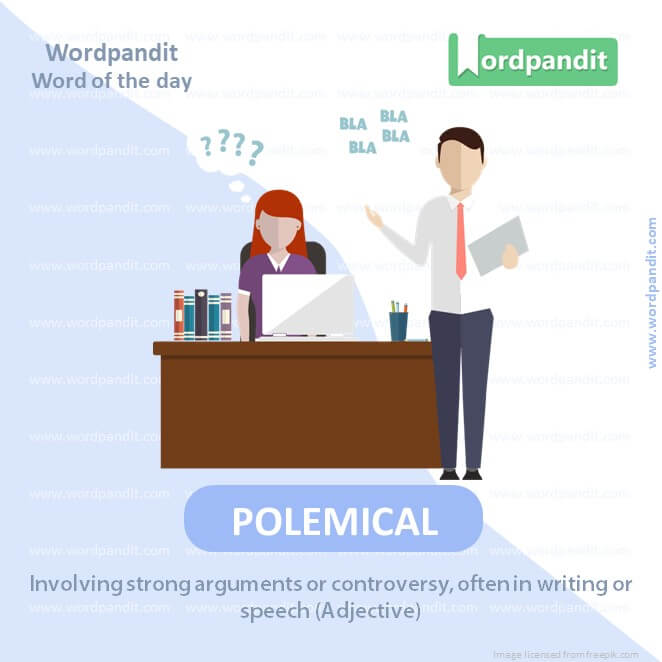
WORD-5: POLEMICAL
CONTEXT: Since both the opening and the concluding statements by Subratada are deeply political and expressly polemical, I am sure he will not mind an equally deeply political and polemical short response to his piece.
SOURCE: Indian Express
EXPLANATORY PARAGRAPH: Let’s say you and your friend are talking about which superhero is the best, and you both have really strong opinions. If you start arguing a lot about it, then you are being “polemical.” It’s a big word that means you’re having a strong debate or argument about something.
MEANING: Involving strong arguments or controversy, often in writing or speech (Adjective).
PRONUNCIATION: poh-leh-mih-kal
SYNONYMS: Controversial, Argumentative, Disputatious, Contentious, Combative, Quarrelsome, Confrontational
USAGE EXAMPLES:
1. The article was polemical in nature and sparked debate.
2. She gave a polemical speech about climate change.
3. The polemical book was banned in several countries.
4. His polemical attitude often got him into arguments.
Certainly! Here are the additional words in the format you’ve requested:
WORD-6: DISRUPT
CONTEXT: They disrupt Parliament, with the result that no meaningful discussion can take place.
SOURCE: Indian Express
EXPLANATORY PARAGRAPH: Imagine you are building a tower with blocks, and someone comes along and knocks it over. That’s called “disrupting.” When something is going smoothly and something else messes it up, that’s what “disrupt” means.
MEANING: To interrupt the normal operation or flow of something (Verb).
PRONUNCIATION: diss-rupt
SYNONYMS: Disturb, Interfere, Upset, Break, Intrude, Obstruct, Derail
USAGE EXAMPLES:
1. The fire alarm disrupted the meeting.
2. She didn’t want to disrupt his concentration.
3. A heavy rainfall disrupted the outdoor event.
4. The internet outage disrupted businesses across the city.
WORD-7: ELABORATE
CONTEXT: The government is always willing to have an elaborate discussion in Parliament before a bill is passed.
SOURCE: Indian Express
EXPLANATORY PARAGRAPH: You know when you draw a simple smiley face and then add a hat, glasses, and maybe even a bowtie to make it fancier? That’s like “elaborating.” The word “elaborate” means to add more details to something to make it more complete or interesting.
MEANING: To add more details to something, often to make it more complete or complex (Verb).
PRONUNCIATION: ih-lab-uh-rayt
SYNONYMS: Expand, Detail, Explain, Develop, Amplify, Enrich, Flesh out
USAGE EXAMPLES:
1. Could you elaborate on your plan?
2. She elaborated the story with colorful characters.
3. The scientist will elaborate on his findings in the next conference.
4. She was asked to elaborate her ideas in an essay.
WORD-8: DEROGATORY
CONTEXT: She instructs students to hit one of their classmates, while referring to his religion in a derogatory manner.
SOURCE: Indian Express
EXPLANATORY PARAGRAPH: If someone says something mean or not nice about another person, we say that it’s “derogatory.” It’s a word that means something is disrespectful or unkind, like calling someone a name that isn’t nice.
MEANING: Expressing a low opinion or disrespect towards someone or something (Adjective).
PRONUNCIATION: duh-rog-uh-tor-ee
SYNONYMS: Disparaging, Insulting, Belittling, Disrespectful, Pejorative, Slanderous, Offensive
USAGE EXAMPLES:
1. He made a derogatory comment about her appearance.
2. The term is considered derogatory and should not be used.
3. Derogatory language has no place in this community.
4. The article contained several derogatory statements.
WORD-9: SCENARIO
CONTEXT: Governments are increasingly prone to using reservation for politically influential groups as a tactic to both build an electoral coalition and offset the challenging employment scenario.
SOURCE: Times of India
EXPLANATORY PARAGRAPH: A “scenario” is like a story in your imagination about what could happen. For example, you might think of a scenario where you become an astronaut and go to the moon! It’s like a pretend situation you think about in your head.
MEANING: An imagined or projected sequence of events, often used for planning or explaining possibilities (Noun).
PRONUNCIATION: Suh-nair-ee-oh
SYNONYMS: Situation, Case, Circumstance, Condition, Event, Instance, Storyline
USAGE EXAMPLES:
1. In the worst-case scenario, we may have to evacuate.
2. The movie presented an interesting scenario.
3. We discussed several scenarios for the upcoming project.
4. He outlined a scenario where the company could fail.
WORD-10: TACTIC
CONTEXT: Governments are increasingly prone to using reservation for politically influential groups as a tactic to both build an electoral coalition and offset the challenging employment scenario.
SOURCE: Times of India
EXPLANATORY PARAGRAPH: A “tactic” is like a special trick or plan you use to do something. Like if you’re playing a game and you have a way to win, that’s your tactic. Or if you clean your room really fast before bedtime so you can read a story, that’s a tactic to get what you want!
MEANING: A specific plan or method used to achieve a goal (Noun).
PRONUNCIATION: tak-tik
SYNONYMS: Strategy, Method, Plan, Maneuver, Approach, Technique, Ploy
USAGE EXAMPLES:
1. His tactic for winning the game was brilliant.
2. She used a clever tactic to solve the problem.
3. They discussed various tactics for improving sales.
4. Changing his tactic, he decided to negotiate instead of arguing.
Vocabulary Daily Use Words
Mastering the art of effective communication involves acquiring a rich vocabulary. A crucial component to this is the learning of vocabulary daily use words. However, how does one assimilate these vocabulary daily use words efficiently into their lexicon? Let’s explore some helpful strategies.
Firstly, the most organic way to encounter vocabulary daily use words is through reading extensively. By reading a variety of texts, we not only come across a plethora of vocabulary daily use words but also understand their contextual application. Books, articles, and even social media posts can provide us with ample examples and familiarity.
Another constructive method is to develop a dedicated vocabulary journal. Here, you can jot down the vocabulary daily use words, their meanings, synonyms, antonyms, and form sentences using them. Regularly revisiting and revising from this journal will enhance your comprehension and recall of vocabulary daily use words.
Mnemonic strategies can also be extremely beneficial in remembering vocabulary daily use words. This could be through associating a word with a related image, creating a catchy jingle, or even forming a story. These visual and auditory cues aid in retaining the vocabulary daily use words, making your learning experience engaging and efficient.
Moreover, the key to mastering vocabulary daily use words lies in their practical application. Use them in your day-to-day conversations, emails, or social media posts. This not only helps in retention but also ensures that your language usage remains rich and diversified.
Finally, exploring and appreciating the history and etymology of words can make your encounter with vocabulary daily use words more fulfilling. The more interested and curious you are about the words you learn, the better you remember them.
In conclusion, the successful learning of vocabulary daily use words involves strategic reading, maintaining a word journal, employing mnemonic devices, using the words regularly, and fostering a spirit of language curiosity. With these strategies, you are sure to enhance your command over vocabulary daily use words, thus enriching your verbal expression.













